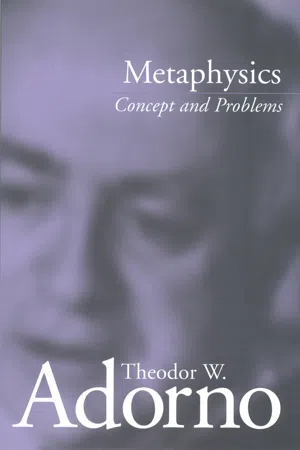
- English
- ePUB (mobile friendly)
- Available on iOS & Android
About this book
Metaphysics for Adorno is defined by a central tension between concepts and immediate facts. Adorno traces this dualism back to Aristotle, whom he sees as the founder of metaphysics. In Aristotle it appears as an unresolved tension between form and matter. This basic split, in Adorno's interpretation, runs right through the history of metaphysics. Perhaps not surprisingly, Adorno finds this tension resolved in the Hegelian dialectic.
Underlying this dualism is a further dichotomy, which Adorno sees as essential to metaphysics: while it dissolves belief in transcendental worlds by thought, at the same time it seeks to rescue belief in a reality beyond the empirical, again by thought. It is to this profound ambiguity, for Adorno, that the metaphysical tradition owes its greatness.
The major part of these lectures, given by Adorno late in his life, is devoted to a critical exposition of Aristotle's thought, focusing on its central ambiguities. In the last lectures, Adorno's attention switches to the question of the relevance of metaphysics today, particularly after the Holocaust. He finds in 'metaphysical experiences', which transcend rational discourse without lapsing into irrationalism, a last precarious refuge of the humane truth to which his own thought always aspired.
This volume will be essential reading for anyone interested in Adorno's work and will be a valuable text for students and scholars of philosophy and social theory.
Tools to learn more effectively

Saving Books

Keyword Search

Annotating Text

Listen to it instead
Information
Abbreviations
GS 1 | Philosophische Frühschriften, 3rd edn, 1996 |
GS 3 | Max Horkheimer and Theodor W. Adorno, Dialektik der Aufklärung. Philosophische Fragmente, 3rd edn, 1996 |
GS 5 | Zur Metakritik der Erkenntnistheorie/Drei Studien zu Hegel, 4th edn, 1996 |
GS 6 | Negative Dialektik/Jargon der Eigentlichkeit, 5th edn, 1996 |
GS 8 | Soziologische Schriften I, 4th edn, 1996 |
GS 9.1 | Soziologische Schriften I. Erste Hälfte, 4, 1975 |
GS 10.1 | Kulturkritik und Gesellschaft I: Prismen/Ohne Leitbild, 2nd edn, 1996 |
GS 10.2 | Kulturkritik und Gesellschaft II: Eingriffe/Stichworte/Anhang, 1977 |
GS 11 | Noten zur Literatur, 4th edn, 1996 |
GS 20.1 | Vermischte Schriften I, 1986 |
GS 20.2 | Vermischte Schriften II, 1986 |
NaS 1.1 | Beethoven. Philosophie der Musik, ed. Rolf Tiedemann, 2nd edn, 1994 |
NaS IV.4 | Kants ‘Kritik der reinen Vernunft’ (1959), ed. Rolf Tiedemann, 1995 |
NaS IV. 10 | Probleme der Moralphilosophie (1963), ed. Thomas Schröder, 1995 |
NaS IV. 15 | Einleitung in die Soziologie (1968), ed. Christoph Gödde, 1993 |
Lecture One
Table of contents
- COVER
- CONTENTS
- TITLE PAGE
- COPYRIGHT
- LECTURE ONE
- LECTURE TWO
- LECTURE THREE
- LECTURE FOUR
- LECTURE FIVE
- LECTURE SIX
- LECTURE SEVEN
- LECTURE EIGHT
- LECTURE NINE
- LECTURE TEN
- LECTURE ELEVEN
- LECTURE TWELVE
- LECTURE THIRTEEN
- LECTURE FOURTEEN
- LECTURE FIFTEEN
- LECTURE SIXTEEN
- LECTURE SEVENTEEN
- LECTURE EIGHTEEN
- EDITOR’S NOTES
- EDITOR’S AFTERWORD
- GLOSSARY OF GREEK TERMS
- INDEX
Frequently asked questions
- Essential is ideal for learners and professionals who enjoy exploring a wide range of subjects. Access the Essential Library with 800,000+ trusted titles and best-sellers across business, personal growth, and the humanities. Includes unlimited reading time and Standard Read Aloud voice.
- Complete: Perfect for advanced learners and researchers needing full, unrestricted access. Unlock 1.4M+ books across hundreds of subjects, including academic and specialized titles. The Complete Plan also includes advanced features like Premium Read Aloud and Research Assistant.
Please note we cannot support devices running on iOS 13 and Android 7 or earlier. Learn more about using the app